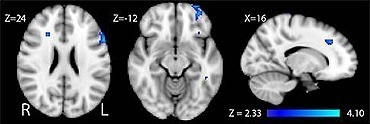Posts Tagged ‘Arthur-Kramer’
Promoting Healthy, Meaningful Aging Through Social Involvement: Building an Experience Corps
(Editor’s note: Pathways responsible for higher-order thinking in the prefrontal cortex (PFC), or executive center of the brain, remain vulnerable throughout life—during critical early-life developmental windows, when the PFC fully matures in the early 20s, and finally from declines associated with old age. At all ages, physical activity and PFC-navigated social connections are essential components…
Read MoreUpdate: Retooling Use It or Lose It at New York Public Library
Here you have the September edition of our monthly newsletter covering cognitive health and brain fitness topics. Please remember that you can subscribe to receive this Newsletter by email, using the box at the top of this page. In the current edition of The Journal on Active Aging, I discuss why we need to Retool “Use…
Read MoreBrain Fitness Update: Best of 2008
Dear reader and member of SharpBrains’ community, We want to thank you for your attention and support in 2008, and wish you a Happy, Prosperous, Healthy and Positive 2009! Below you have the December edition of our monthly newsletter. Enjoy: Best of 2008 Announcing the SharpBrains Most Important Book of 2008: Neuroscientist Torkel Klingberg has written a very…
Read MoreAre videogames good for YOU? Depends on who YOU are
Two recent scientific studies published by Dr. Arthur Kramer and colleagues present fascinating results. The two studies are: 1) Basak C, et al “Can training in a real-time strategy video game attenuate cognitive decline in older adults?” Psychol Aging 2008; DOI: 10.1037/a0013494. 2) Boot, W. R., Kramer, A. F., Simons, D. J., Fabiani, M. & Gratton,…
Read MoreGames for Brain Health — Novelty, Variety and Challenge
Landmark study just published: Basak C, et al “Can training in a real-time strategy video game attenuate cognitive decline in older adults?” Psychol Aging 2008; DOI: 10.1037/a0013494. Playing computer games improves brain power of older adults, claim scientists (Telegraph) — The team at the University of Illinois recruited 40 adults over 60 years old, half…
Read MoreRetain older workers beyond retirement
BusinessWeek covers a best practice in a topic of growing importance: how large companies can retain older workers in productive ways beyond a set arbitrary retirement age. Issue: Retiring Employees, Lost Knowledge (Business Week) A pilot program at American Express gives soon-to-be retirees less work and more time to pass along their expertise to younger generations -…
Read More
